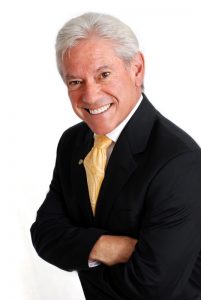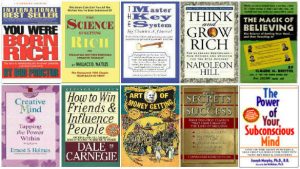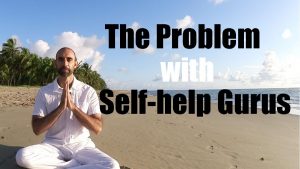By Ray Williams, October 19, 2019

In times of doubt and uncertainty, many people turn to self-help books, groups or gurus in search of encouragement, guidance and self-affirmation. The positive self-statements suggested in these books, such as “I am a lovable person” or “I will succeed,” are designed to lift a person’s low self-esteem and push them into positive action. But there is a negative side to the self-help movement.

Dale Carnegie said that, almost 80 years ago. Carnegie, a wildly popular lecturer in self-improvement right across Depression-era America, is in many ways the originator of the whole self-help movement that, today, is a multimillion-dollar industry, that keeps getting bigger. His 1936 book, How to Win Friends and Influence People, has set the benchmark for the kind of navel-gazing that asked us all to pull up our bootstraps sharpish, and go make something of ourselves. The book has now sold more than 16 million copies around the world, and, in addition to helping legions of the presumably needy, it has also encouraged others to do much as he had done: write a tome about how others can empower and better themselves.
Since the latter half of the 20th century, we have lived in a world dominated by their kind, these often self-appointed lifestyle gurus spouting all manner of advice, and whose books, many of which spawn sequels that spawn sequels, sell in the kind of numbers Booker book prize winners can only dream of.
Thousands of books are published each year promising to help people from everything from dating to physical and mental health problems, with most of them not based on any evidential research.
However, clinical psychologist Joseph C. Kobos, who chairs the American Psychological Association’s (APA) Board of Professional Affairs, says, if a particular book has made the top 10 lists, it’s probably got some substance.” Kobos notes that M. Scott Peck’s book, “The Road Less Traveled,” has been on the best-seller list for 10 years. “I think people must be getting some value out of it to keep it there.”
The American Psychological Assocaition has no guidelines for self-help books or on how to use them with patients, Kobos says. The APA’s ethical standards does urge professional psychologists who produce materials for the public to “present the material fairly and accurately, avoiding misrepresentation through sensationalism, exaggeration or superficiality. ”
But Gerald M. Rosen, Ph.D., a clinical associate professor in the departments of psychology and psychiatry at the University of Washington says that psychologists largely have failed to develop and market their self-help books responsibly, says “What I’m against is psychologists making exaggerated and untested claims,” he says.
It’s difficult to judge the veracity of self-help ideas because they are hard to define. Does it matter that self-administered materials often are used to treat such limited problems as addictive behaviors? How often do self-help therapies that don’t work get written about? And how often do self-help claims measured against research for validation or accuracy?
For some self-help claims, the outcome appears to be the same as those of treatments conducted by some therapist or psychologists, according to a study in Psychological Science. Another study concluded that most self-help consumers are satisfied with the results they receive from their reading but for every study that appears to support the effectiveness of self-administered treatment, there’s another that denies it or raises serious questions.
Self-Help Groups

According to Web MD, the number of self-help organizations and online support groups has grown dramatically. In 1986, the American Self-Help Group Clearinghouse had 332 associations in its roster. Today, it has more than 1,500 groups that meet either face-to-face or online.
John C. Norcross, PhD., Distinguished Professor of Psychology at the University of Scranton, Adjunct Professor of Psychiatry at SUNY Upstate Medical University, says at least 18% of Americans will visit at least one self-help group meeting in their lifetime, and at least 75% to 80% of all people with access to the web have already gone there for health information.
The self-help movement has become so pervasive and accepted that many psychologists recommend self-help resources to their patients as an adjunct to psychotherapy, adds Norcross, who has authored his own self-help book, The Authoritative Guide to Self-Help Resources and Mental Health.
Many people who look for self-help groups or online support groups want to connect with others who are going through the same problems, says Edward J. Madara, director of the American Self-Help Group Clearinghouse. The most commonly shared troubles, he says, have to do with illness, addiction, bereavement, disabilities, and parenting.
Online, people who look for health information typically seek mental health topics, including how to deal with anxiety and depression, how to handle relationships, and how to manage kids, says Norcross.
Andrew Weil, MD, author of the self-help book, 8 Weeks to Optimum Health, says “Our culture lacks a sense of purpose,” and “I think, in some ways, we have too much in the material realm, and not enough in terms of community and spiritual health.” Weil points out that the drive toward self-help may be part of a natural human instinct to look for fulfillment.
Self-Help Gurus

There is no shortage of self-help gurus who promise to give the formula for success or happiness, and motivate and inspire you. And some of them may do that—for a short period of time. And some of them may have useful behavioral strategies or tips to make changes in your life.
So do ancient philosophers and spiritual leaders. But their books and videos don’t inundate the public.
We can separate the advice and insights some experts provide that can be useful and motivational in life—those who base their ideas on evidential research—from those who have little or no qualifications and base their ideas on anecdotes or personal experience. Unfortunately, far too many people put their faith in the former than the latter.
Psychologist Jim Taylor is critical of self-help gurus. He writes in Psychology Today, “Numerous articles have been written about the disingenuousness and downright dishonesty of self-help gurus and their services and products (just do a web search of “self-help industry” and see for yourself). We hear the outrageous promises of fast and easy change that simply affirm the well-known saying often attributed to P. T. Barnum, ‘There’s a sucker born every minute.’ We hear claims cloaked in scientific language (e.g., the Law of Attraction offered in The Secret is, according to its author Rhonda Byrnes, a natural law as real as gravity). We hear the sardonic commentary that the only people who are being helped are the gurus who are making millions off of gullible buyers of self-help books, CDs, and DVDs.”
When we watch a motivational video or listen to an inspiring speech, we feel amazing for a little while. However, that feeling never lasts. It’s similar to that feeling that you get at the beginning of the year when you set yourself a brand new resolution to do X, Y or Z. That positive feeling lasts for a little while, but it eventually – and often quickly – fades. As a result of this fading energy, you have to go back for another hit of motivation. This happens over and over again. In reality, the guru isn’t actually helping you. They may even be doing more damage than they are doing good. Because no lasting change is being fostered or created, you have to repeat the cycle of returning to the guru for more.
To be fair, there are some self-help gurus who have either spread their ideas—and in some cases based on some research—who have created useful and motivational sources for people needing to seek change in their life. But these are not numerous.
In my article, “Why Don’t My Positive Affirmations Work?”I said “The reason positive affirmations don’t work is that they target the conscious level of your mind, but not the unconscious. If what you are trying to affirm is incongruent with a deeply held negative belief, then all that results is an inner struggle.
“Let’s say you believe that you are “ugly and worthless” – a commonly held belief by depressed people all over the world. This belief may feel deeply and irrevocably true, no matter what the actual reality might be. For example, at the peak of her career Jane Fonda was held to be one of the most beautiful women in the world, yet, as her autobiography reveals, she judged her physical appearance as inadequate and struggled with eating disorders for decades.”
I go on to argue, “Another potential hitch in the positive-thinking movement is that a sanguine attitude may be unhealthy when taken to an extreme, because it can become unhinged from reality. In a 2000 article University of Michigan psychologist Christopher Peterson, a founder of the positive psychology movement, distinguished realistic optimism, which hopes for the best while remaining attuned to potential threats, from unrealistic optimism, which ignores such threats.”
“A 2007 study by University of Virginia psychologist Shigehiro Oishi, University of Illinois psychologist Ed Diener and Michigan State University psychologist Richard Lucas reinforces Peterson’s concerns. Using analyses from several large international samples, they found that although extremely happy people are the most successful in close interpersonal relationships and volunteer work, moderately happy people are more successful than extremely happy people financially and educationally and are also more politically active. Admittedly, Oishi and his colleagues measured happiness rather than optimism per se, although the two tend to be fairly closely associated. Still, their findings raise the possibility that although a realistically positive attitude toward the world often helps us to achieve certain life goals, a Pollyannaish attitude may have its costs—perhaps because it fosters complacency.
“Canadian researcher Dr. Joanne Wood at the University of Waterloo and her colleagues at the University of New Brunswick, who have published their research in the Journalof Psychological Science, concluded, “repeating positive self-statements may benefit certain people, such as individuals with high self-esteem, but backfire for the very people who need them the most.”
“The researchers asked people with and low self-esteem to say “I am a lovable person.” They then measured the participants’ moods and their feelings about themselves. The low-esteem group felt worse afterwards compared with others who did not. However, people with high self-esteem felt better after repeating the positive affirmation–but only slightly. The psychologists then asked the participants to list negative and positive thoughts about themselves. They found, paradoxically, those with low self-esteem were in a better mood when they were allowed to have negative thoughts than when they were asked to focus exclusively on affirmative thoughts.”
“The researchers suggest that, like overly positive praise, unreasonably positive self-statements, such as “I accept myself completely” can provoke contradictory thoughts in individuals in individuals with low self-esteem. When positive self-statements strongly conflict with self-perception, the researchers argue, there is not mere resistance but a reinforcing of self-perception. People who view themselves as unlovable, for example, find that saying to themselves they are lovable it can be unbelievable which in turn strengthens their own negative view rather than reversing it. These findings were supported by previous research published in 1994 in the Journal of Social Psychology, showing that when people get feedback that they believe is overly positive, they actually feel worse, not better.”
What Does the Research Say About Self-Help Books?
According to recent studies, however, the positive affirmations and “miracle” solutions that self-help books have, can actually have the opposite effect. Psychologists Joanne V. Wood and John W. Lee from the University of Waterloo, and W.Q. Elaine Perunovic from the University of New Brunswick asked participants in a study with low self-esteem and high self-esteem to repeat the self-help book phrase “I am a lovable person.” The psychologists then measured the participants’ moods and their momentary feelings about themselves. As it turned out, the individuals with low self-esteem felt worse after repeating the positive self-statement compared to another low self-esteem group who did not repeat the self-statement. The individuals with high self-esteem felt better after repeating the positive self-statement–but only slightly.
In a follow-up study, the psychologists allowed the participants to list negative self-thoughts along with positive self-thoughts. They found that, paradoxically, low self-esteem participants’ moods fared better when they were allowed to have negative thoughts than when they were asked to focus exclusively on affirmative thoughts.
The psychologists suggested that, like overly positive praise, unreasonably positive self-statements, such as “I accept myself completely,” can provoke contradictory thoughts in individuals with low self-esteem. Such negative thoughts can overwhelm the positive thoughts. And, if people are instructed to focus exclusively on positive thoughts, they may find negative thoughts to be especially discouraging.
As the authors concluded, “Repeating positive self-statements may benefit certain people [such as individuals with high self-esteem] but backfire for the very people who need them the most.”
Consumers of self-help books are more sensitive to stress and show higher depressive symptomatology, according to a study conducted by researchers at the CIUSSS de l’Est-de-l’Île-de-Montréal (Institut universitaire en santé mentale de Montréal) and the University of Montreal, the findings of which were published in Neural Plasticity.
“The sale of self-help books generated over $10 billion in profits in 2009 in the US, which is a good reason to find out if they have a real impact on readers,” said Sonia Lupien, Director of the Centre of Studies on Human Stress (CSHS). “Initially, we thought we had observed a difference in participants in terms of personality, sense of control, and self-esteem based on their self-help reading habits,” explained Catherine Raymond, first author of the study and a doctoral student at the CSHS of the Institut universitaire en santé mentale de Montréal. “In reality, there seems to be no difference between those who read and those who do not read these types of books. However, our results show that while consumers of certain types of self-help books secrete higher levels of cortisol (a stress hormone) when confronted with stressful situations, consumers of another type of self-help books show higher depressive symptomatology compared to non-consumers,” said the student in neuroscience at the University of Montreal’s Faculty of Medicine.
Method
The CSHS team recruited 30 participants, half of whom were consumers of self-help books. The team measured several elements of the participants, including stress reactivity (salivary cortisol levels), openness, self-discipline, extraversion, compassion, emotional stability, self-esteem, and depressive symptoms. The group of self-help book consumers was itself divided into two types of readers: those who preferred problem-focused books (e.g. Why Is It Always About You? or How Can I Forgive You?: The Courage to Forgive, the Freedom Not To) and those who preferred growth-oriented books (e.g.,You’re Stronger Than You Think or How to Stop Worrying and Start Living). The results showed that consumers of problem-focused self-help books consumers presented greater depressive symptoms and that growth oriented self-help books consumers presented increased stress reactivity compared to non-consumers.
The chicken or the egg?
Does reading self-help books increase the stress reactivity and depressive symptomatology of self-help readers or are they more sensitive to stressful situations? It is difficult to determine the cause of this observation. “Further research will help us learn more,” according to Lupien. “Nevertheless, it seems that these books do not produce the desired effects. When we observe that the best predictor of purchasing a self-help book is having bought one in the past year,1 it raises doubts about their effectiveness. Logically, if such books were truly effective, reading just one would be enough to solve our problems,” said the researcher at the Institut universitaire en santé mentale de Montréal. For this reason, she encourages people to rather consult books that report scientifically proven facts and are written by researchers or clinicians affiliated with recognized universities, health care facilities, or research centres. “Check your sources to avoid being disappointed. A good popular science book doesn’t replace a mental health professional but it can help readers better understand stress and anxiety and encourage them to seek help.
Conclusion:
Self-help books may be helpful, but too many people expect them to work magic or provide a quick solution. As an experienced coach, having worked with hundreds of people, I think self-help books can be helpful in combination withworking with a professional coach, therapist, or counselor. Some self-help books are great if the intent is to be inspirational or spiritual or contain personal accounts that can motivate the human spirit. I would be cautious of self-help books that claim to provide the formula for success, as there is none. There are too many variables. Finally, I would suggest when you encounter a self-help book or guru or idea that you may be drawn to or is receiving a lot of publicity, ask yourself, “how much of the content is based on research that is valid and reliable?”
Copyright: Neither this article or a portion thereof may be reproduced in any print or media format without the express permission of the author.
Read my latest books:
- I Know Myself And Neither Do You: Why Charisma, Confidence and Pedigree Won’t Take You Where You Want To Go, available in paperback and ebook formats on Amazon and Barnes and Noble world-wide.
- Eye of the Storm: How Mindful Leaders Can Transform Chaotic Workplaces, available in paperback and Kindle onAmazonandBarnes & Noble world-wide..




